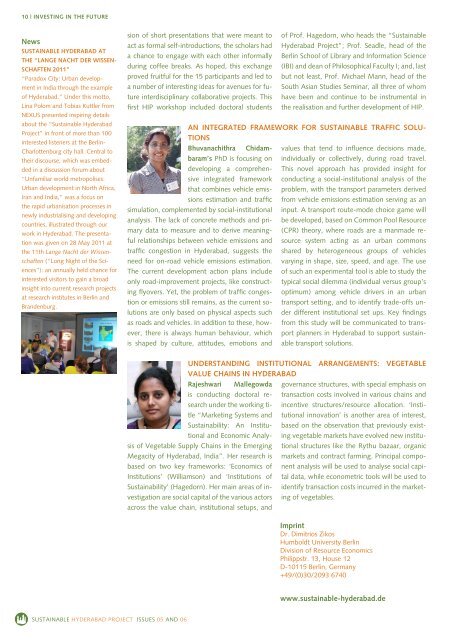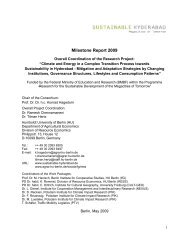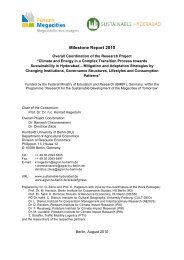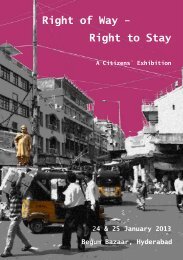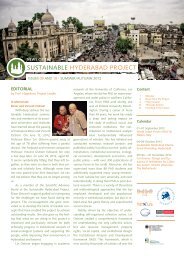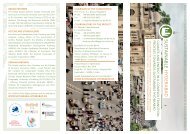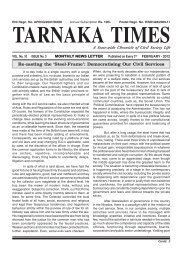SUSTAINABLE HYDERABAD PROJECT
SUSTAINABLE HYDERABAD PROJECT
SUSTAINABLE HYDERABAD PROJECT
Create successful ePaper yourself
Turn your PDF publications into a flip-book with our unique Google optimized e-Paper software.
10 | INVESTING IN THE FUTURE TORIAL<br />
News<br />
<strong>SUSTAINABLE</strong> <strong>HYDERABAD</strong> AT<br />
THE “LANGE NACHT DER WISSEN-<br />
SCHAFTEN 2011”<br />
“Paradox City: Urban development<br />
in India through the example<br />
of Hyderabad.” Under this motto,<br />
Lina Polom and Tobias Kuttler from<br />
NEXUS presented inspiring details<br />
about the “Sustainable Hyderabad<br />
Project” in front of more than 100<br />
interested listeners at the Berlin-<br />
Charlottenburg city hall. Central to<br />
their discourse, which was embedded<br />
in a discussion forum about<br />
“Unfamiliar world metropolises:<br />
Urban development in North Africa,<br />
Iran and India,” was a focus on<br />
the rapid urbanisation processes in<br />
newly industrialising and developing<br />
countries, illustrated through our<br />
work in Hyderabad. The presentation<br />
was given on 28 May 2011 at<br />
the 11th Lange Nacht der Wissenschaften<br />
(“Long Night of the Sciences”):<br />
an annually held chance for<br />
interested visitors to gain a broad<br />
insight into current research projects<br />
at research institutes in Berlin and<br />
Brandenburg.<br />
sion of short presentations that were meant to<br />
act as formal self-introductions, the scholars had<br />
a chance to engage with each other informally<br />
during coffee breaks. As hoped, this exchange<br />
proved fruitful for the 15 participants and led to<br />
a number of interesting ideas for avenues for future<br />
interdisciplinary collaborative projects. This<br />
first HIP workshop included doctoral students<br />
AN INTEGRATED FRAMEWORK FOR <strong>SUSTAINABLE</strong> TRAFFIC SOLU-<br />
TIONS<br />
Bhuvanachithra Chidam-<br />
values that tend to influence decisions made,<br />
baram’s PhD is focusing on<br />
developing a comprehensive<br />
integrated framework<br />
that combines vehicle emissions<br />
estimation and traffic<br />
simulation, complemented by social-institutional<br />
analysis. The lack of concrete methods and primary<br />
data to measure and to derive meaningful<br />
relationships between vehicle emissions and<br />
traffic congestion in Hyderabad, suggests the<br />
need for on-road vehicle emissions estimation.<br />
The current development action plans include<br />
only road-improvement projects, like constructing<br />
flyovers. Yet, the problem of traffic congestion<br />
or emissions still remains, as the current solutions<br />
are only based on physical aspects such<br />
as roads and vehicles. In addition to these, however,<br />
there is always human behaviour, which<br />
is shaped by culture, attitudes, emotions and<br />
of Prof. Hagedorn, who heads the “Sustainable<br />
Hyderabad Project”; Prof. Seadle, head of the<br />
Berlin School of Library and Information Science<br />
(IBI) and dean of Philosophical Faculty I; and, last<br />
but not least, Prof. Michael Mann, head of the<br />
South Asian Studies Seminar, all three of whom<br />
have been and continue to be instrumental in<br />
the realisation and further development of HIP.<br />
individually or collectively, during road travel.<br />
This novel approach has provided insight for<br />
conducting a social-institutional analysis of the<br />
problem, with the transport parameters derived<br />
from vehicle emissions estimation serving as an<br />
input. A transport route-mode choice game will<br />
be developed, based on Common Pool Resource<br />
(CPR) theory, where roads are a manmade resource<br />
system acting as an urban commons<br />
shared by heterogeneous groups of vehicles<br />
varying in shape, size, speed, and age. The use<br />
of such an experimental tool is able to study the<br />
typical social dilemma (individual versus group’s<br />
optimum) among vehicle drivers in an urban<br />
transport setting, and to identify trade-offs under<br />
different institutional set ups. Key findings<br />
from this study will be communicated to transport<br />
planners in Hyderabad to support sustainable<br />
transport solutions.<br />
UNDERSTANDING INSTITUTIONAL ARRANGEMENTS: VEGETABLE<br />
VALUE CHAINS IN <strong>HYDERABAD</strong><br />
Rajeshwari Mallegowda governance structures, with special emphasis on<br />
is conducting doctoral research<br />
under the working title<br />
“Marketing Systems and<br />
Sustainability: An Institutional<br />
and Economic Analysis<br />
of Vegetable Supply Chains in the Emerging<br />
Megacity of Hyderabad, India”. Her research is<br />
based on two key frameworks: ‘Economics of<br />
Institutions’ (Williamson) and ‘Institutions of<br />
Sustainability’ (Hagedorn). Her main areas of investigation<br />
are social capital of the various actors<br />
across the value chain, institutional setups, and<br />
transaction costs involved in various chains and<br />
incentive structures/resource allocation. ‘Institutional<br />
innovation’ is another area of interest,<br />
based on the observation that previously existing<br />
vegetable markets have evolved new institutional<br />
structures like the Rythu bazaar, organic<br />
markets and contract farming. Principal component<br />
analysis will be used to analyse social capital<br />
data, while econometric tools will be used to<br />
identify transaction costs incurred in the marketing<br />
of vegetables.<br />
Imprint<br />
Dr. Dimitrios Zikos<br />
Humboldt University Berlin<br />
Division of Resource Economics<br />
Philippstr. 13, House 12<br />
D-10115 Berlin, Germany<br />
+49/(0)30/2093 6740<br />
www.sustainable-hyderabad.de<br />
<strong>SUSTAINABLE</strong> <strong>HYDERABAD</strong> <strong>PROJECT</strong> ISSUES 05 AND 06


